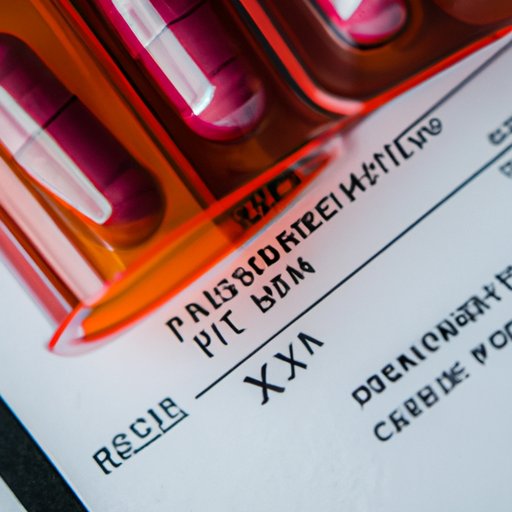
Introduction
Traveling with prescription medication can be a common concern for those who rely on medication to stay healthy. Whether it’s for a weekend getaway or a long-distance trip, travelers should know what medications they can bring with them on a plane and the TSA guidelines for traveling with medication. This article aims to provide a comprehensive guide to traveling with prescription medication, including TSA regulations and useful tips for packing and organizing medication.
TSA Rules and Regulations Surrounding Prescription Medication
The Transportation Security Administration (TSA) has strict guidelines in place for carrying prescription medication on a plane. It is important to comply with TSA regulations to ensure the safety of all passengers aboard a flight.
TSA allows travelers to bring all prescription medications, over-the-counter (OTC) medications, and medical devices in their carry-on bags or checked luggage. However, there are specific rules and restrictions regarding the amount and type of medication allowed.
Liquids, gels, and aerosols (LGA) that exceed the 3.4-ounce limit are prohibited in carry-on bags. However, TSA has made some exceptions for medication, such as insulin and other life-saving medications. Additional rules may apply, and travelers should contact the airline or TSA customer service for more information.
When it comes to packing medication in carry-on bags, it is essential to pack them in a clear plastic bag and present them at the security checkpoint. Always declare the medication to the TSA officer, and be prepared for additional screening procedures if necessary. In case of injectable medication, travelers must also inform TSA about the syringes and other medical supplies they are carrying.
Tips and Tricks for Traveling with Prescription Medication
Travelers should take extra precautions when packing and organizing prescription medication to avoid encountering problems at the airport checkpoint. Here are some helpful tips:
- Always pack medication in the original containers, with the prescription label that includes the traveler’s name and dosage.
- Carry a copy of the prescription or a doctor’s note with the traveler’s name and the medication they’re taking in case of emergency or issues during the security check-in.
- Pack all medication in a designated carry-on bag separate from other luggage. This helps to get easy access to medication and avoids delays at the airport.
- Prescription medication that needs to be refrigerated should be carried in a travel cooler with refrigerant gel packs or a frozen gel pack.
- Always pack extra medication to cover the duration of the trip and some extra days in case of emergency travel situations.
Common Misconceptions about Prescription Medication and Air Travel
There are some misconceptions that travelers have about bringing medication on a plane. Here are some popular myths:
- Travelers are allowed to bring unlimited amounts of medication on a plane. This is not true, as TSA has restrictions on the amount of medication that can be carried on.
- Medication can be transported in an unlabeled container. For safety and verification purposes, travelers should always keep their medication in the original container with the prescription label.
- Prescription medication does not need to be declared to the TSA. TSA requires travelers to declare all medication during the security check-in procedure.
It is important to verify and understand TSA guidelines for prescription medication before traveling.
The Consequences of Attempting to Bring Unauthorized Prescription Medication on a Plane
Breaking TSA regulations for medication can have legal and financial consequences. The penalties for unauthorized prescription medication on a plane can range from fines to imprisonment. Travelers should always adhere to TSA regulations when traveling with prescription medication.
TSA officers have the discretion to deny access to anyone who does not follow regulations. In severe cases, the traveler may face further legal action and be banned from future travel.
Examples of penalties for unauthorized medication include fines up to $5,000 and imprisonment for up to five years in federal prison.
Expert Advice on Navigating the Complexities of Traveling with Prescription Medication
Pharmacists and medical professionals can be great resources when it comes to traveling with prescription medication. Here are some tips recommended by pharmacists and medical professionals:
- Plan ahead and contact the airline or TSA customer service to verify regulations about medication, especially if traveling internationally.
- It is always a good idea to carry a copy of the prescription along with the medication. This helps prevent any misunderstandings during the checkpoint process.
- For long flights, take medications before boarding and plan to keep any necessary medication nearby on the plane.
- Carrying a pillbox that outlines the dosage schedule can help travelers stay organized and avoid missed dosages.
- Packing medication that needs special storage instructions, such as refrigeration, should be placed in insulated containers.

A Personal Experience of Someone Who Recently Traveled with Prescription Medication and How They Prepared for Their Journey
One traveler who recently traveled with prescription medication described challenges when traveling with medication. She admitted that it is not always easy to carry multiple medications when traveling and recommended planning ahead before traveling with medication.
She packed all the medication in a plastic bag with the prescription label and also carried a doctor’s note with her name and the medication’s name.
She also packed extra medication for the duration of the trip and some extra days in case of unexpected events. She kept the medication bag in a separate carry-on bag so that she could easily take it out for the checkpoint process and at the hotel.
Conclusion
Traveling with prescription medication can be complicated, but by following the rules and tips outlined in this article, travelers can avoid problems and make the process smoother. Remember to communicate with TSA agents, keep medication in its original packaging, and carry copies of prescriptions. Always plan ahead by verifying rules and regulations with the airline or TSA to ensure a safe and successful trip.




